July 16, 2021
We are building an end-of-life care options movement that is understanding, accepting and valuing of differences between people including those:
- of different races, ethnicities, genders, ages, religions, disabilities and sexual orientations;
- with differences in education, personalities, skill sets, experiences and knowledge bases; and
- with different ideologies and traditions.
Defining and Measuring Progress
Our work accelerated in 2018 with a new diversity and inclusion values statement; an updated strategic plan which elevated the issues of diversifying the end-of-life care movement; and an increased budget to advance diversity, equity and inclusivity within Compassion & Choices and across the movement at large.
While our work has evolved over the years, and will continue to do so as we learn and grow, we will always ground our approach in data to chart a measurable path forward. In 2020, we updated our values statement and expanded our strategic plan further to include measurable objectives centered on addressing health equity and growing a more diverse end-of-life care movement. With this three-year progress report, we are providing greater transparency, insight and accountability into our work.
Within The Movement
Over the past year, we have expanded efforts to engage authentically with various constituency groups. We worked with voices within communities to guide us through engagement, development, communications and policy work to ensure our work is culturally competent. Our initial efforts focused on African Americans, Latinos/Hispanics, people with disabilities, the LGBTQ community and faith leaders from these various communities. We have expanded this to include outreach to Asian American, Native Hawaiian and Pacific Islander communities.
Bringing Important Voices to the Conversation
Compassion & Choices now has four Leadership Councils that are permanent parts of our organization. Our councils are composed of community leaders from diverse professional backgrounds, including faith leaders, a legendary civil rights advocate, physicians, media influencers, nurses, executives, family members of deceased advocates and administrative policy makers to guide our work:
- African American Leadership Council
- Latino Leadership Council
- Asian American, Native Hawaiian and Pacific Islander Leadership Council
- LGBTQ Advisory Council (launching Fall 2021)
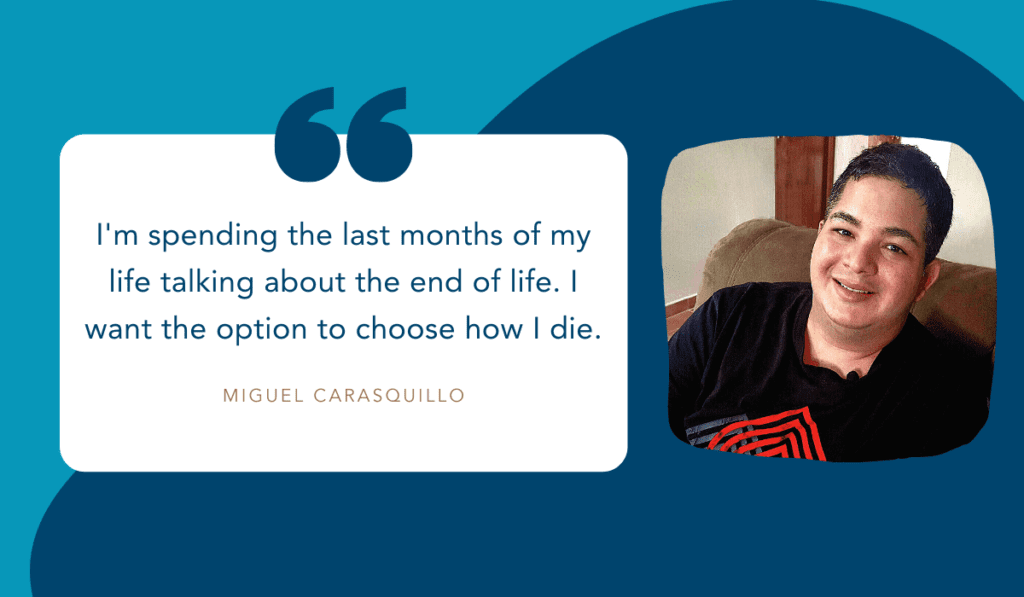 These councils provide critical leadership and insight into our work. With their guidance, we have built partnerships with a dozen African American or Latino/Hispanic serving organizations, with the goal of educating their constituents about the importance of end-of-life planning and closing the disparities in care that exist at life’s end for African Americans and Hispanics. Most recently, we launched a historic collaboration with the Mexican Consulate and Ventanillas de Salud (Windows of Health) on a bilingual educational campaign to inform more than 1 million U.S.-based Mexican immigrants about their full range of end-of-life care options. Our partnership with the Sam De Witt Proctor conference, a cross section of progressive African American faith leaders and their congregations, resulted in a covenant on end-of-life care and planning that outlined their commitment to advance care planning and education.
These councils provide critical leadership and insight into our work. With their guidance, we have built partnerships with a dozen African American or Latino/Hispanic serving organizations, with the goal of educating their constituents about the importance of end-of-life planning and closing the disparities in care that exist at life’s end for African Americans and Hispanics. Most recently, we launched a historic collaboration with the Mexican Consulate and Ventanillas de Salud (Windows of Health) on a bilingual educational campaign to inform more than 1 million U.S.-based Mexican immigrants about their full range of end-of-life care options. Our partnership with the Sam De Witt Proctor conference, a cross section of progressive African American faith leaders and their congregations, resulted in a covenant on end-of-life care and planning that outlined their commitment to advance care planning and education.
We also worked alongside national organizations to create formal public resolutions that encourage proactive work in educating, empowering and advocating for end-of-life experiences that reflect one's values: NOBEL Women, the National Black Caucus of State Legislators and the African American Mayors Association. The impact of these resolutions was almost immediate, leading to collaborations with Minnesota Representative Rena Moran and the official declaration of April 16 as Healthcare Decisions Day by St. Paul Mayor Melvin Carter.
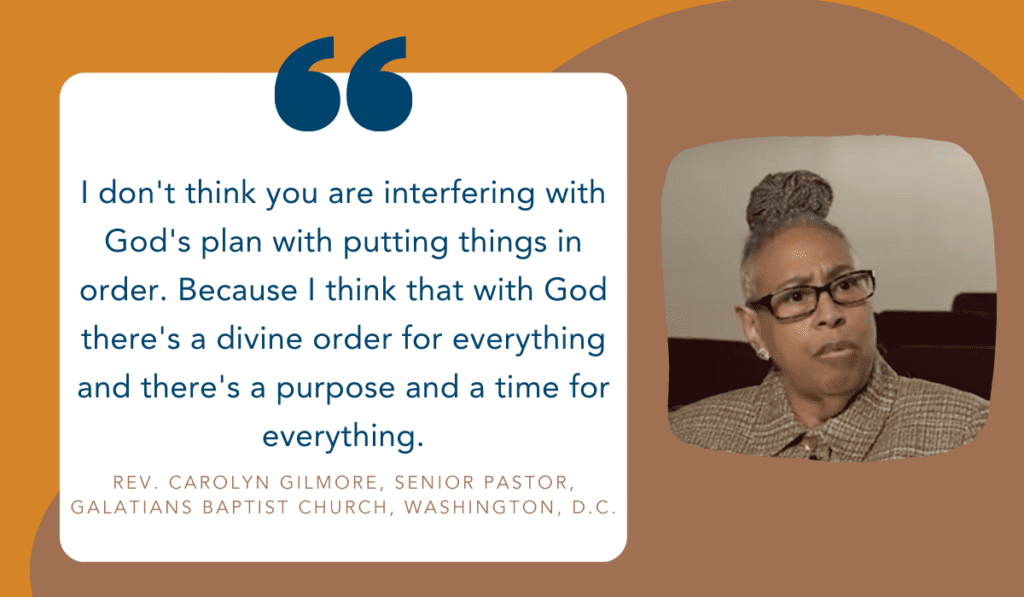 We also expanded outreach efforts to faith leaders including launching a faith leadership council with nearly 50 members from various religious backgrounds. Members of the council signed letters to Congress, submitted letters to the editor, testified before state legislators and shared information about end-of-life planning with their congregants. Additionally, a Faith Leaders for Choice event will feature voices from various religions who will come together for the shared goal of advocating for individual empowerment at the end of life.
We also expanded outreach efforts to faith leaders including launching a faith leadership council with nearly 50 members from various religious backgrounds. Members of the council signed letters to Congress, submitted letters to the editor, testified before state legislators and shared information about end-of-life planning with their congregants. Additionally, a Faith Leaders for Choice event will feature voices from various religions who will come together for the shared goal of advocating for individual empowerment at the end of life.
Every June, Compassion & Choices celebrates Pride Month and the LGBTQ+ community by disseminating our bilingual toolkits to supporters and staff who want to represent Compassion & Choices at Pride events in their area or online, and elevating the voices of supporters, such as SAGE, from these communities through digital and other media channels.
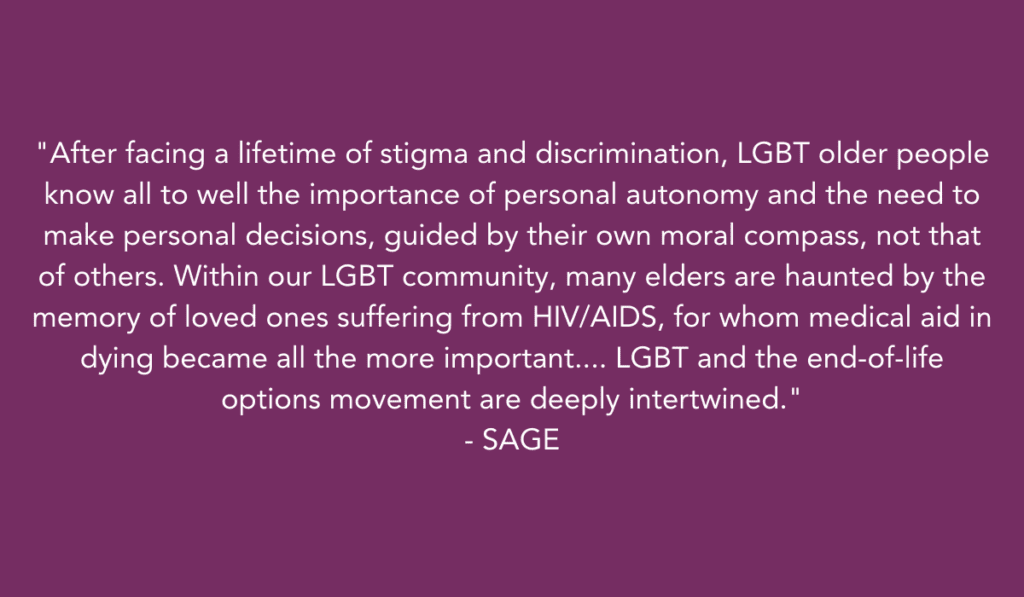
Creating Culturally Relevant Messages, Tools and Products
To reach disparate populations effectively, our messages must reflect culturally relevant information that resonates with that audience.
We are working closely with our Leadership Councils and with the members of various communities to begin a meaningful dialogue and learn the priorities, questions and concerns of these communities as we develop targeted digital ads, website content, webinars, talking points and other resources, including:
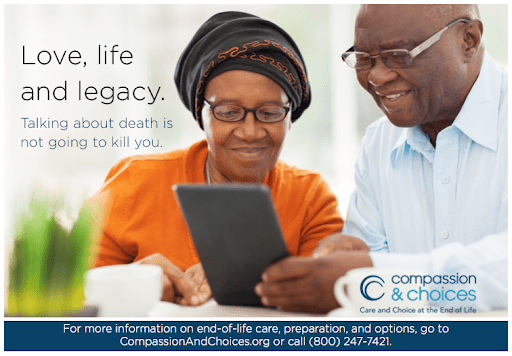 Creating an engaging and actionable website portal with entry points to culturally competent information and resources for specific communities.
Creating an engaging and actionable website portal with entry points to culturally competent information and resources for specific communities.- Developing timely webinar content to reach a broader, more diverse audience with community voices that includes integration with Facebook Live, Instagram TV and YouTube.
- Creating tailored ads for placement in targeted channels, including the 2020 Social Justice in America report published by the Martin Luther King Jr. Center for Nonviolent Change, to encourage people to understand the importance of preparing for the end of life.
- An ad placed in the USA Today in collaboration with the Oprah Network, extended our reach exponentially.
- Producing compelling videos that highlight some of the challenges faced with end-of-life planning and encourage people to start the process.
- Our California public service announcements, featuring Dan Diaz, Dolores Huerta and Compassion & Choices board member Rev. Madison T. Shockley, educate residents about the state’s End-of-Life Option Act and aired in a record number of outlets.
- Mailing impassioned letters to more than 74,000 people, inspiring them to begin their path to advance care planning by requesting our My End-of-Life Decisions Guide and Toolkit.
- Translating key education and advocacy materials into Spanish, including our popular and useful COVID-19 toolkit.
- Distributing Pride in a Box toolkits to organizations across the country to educate people, specifically the LGBTQ community, about the need for compassionate end-of-life planning and options.
Tapping a Range of Communication Channels
We are taking our cues from the audiences we seek to reach via preferred channels of communication. For example, we are:
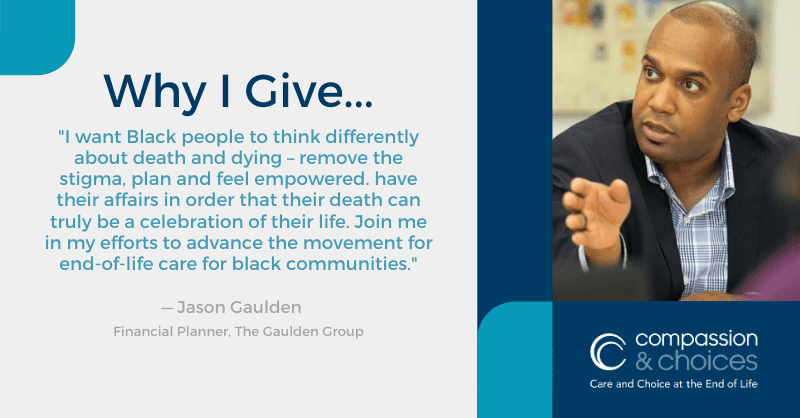 Creating a new Twitter account, @BlackLegacyPla1, by and for Black communities to encourage planning for end of life.
Creating a new Twitter account, @BlackLegacyPla1, by and for Black communities to encourage planning for end of life.- Conducting a social media campaign, “Why I Give,” where supporters describe why they contribute to help us achieve our goals.
- Building trending conversations and elevating Compassion & Choices’ commitment and values by expanding our social media presence and creating #hashtags to engage with people of color.
- Penetrating key national media with feature stories and op-eds in print, broadcast and digital at the local, regional and national levels, securing key coverage in:
- The Santa Fe New Mexican, which published an opinion piece by Jorge Otero about his father’s suffering as cancer overtook him. The Albuquerque Journal also published a supportive editorial.
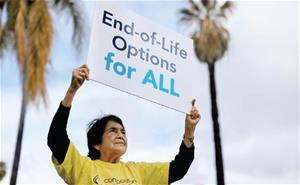 The Associated Press distributed Dolores Huerta’s End-of-Life Options for ALL article. The story was published in more than 200 publications throughout the United States. Ms. Huerta is a member of our Latino Leadership Council.
The Associated Press distributed Dolores Huerta’s End-of-Life Options for ALL article. The story was published in more than 200 publications throughout the United States. Ms. Huerta is a member of our Latino Leadership Council.- People Magazine and People en Español published a story on Hanna Olivas, a Nevada Latina mom with incurable blood cancer.
- Los Angeles Times en Español published an op-ed by Hollywood actor Mauricio Ochmann on the importance of end-of-life conversations during a pandemic. The paper also published an exclusive interview with Amanda Villegas, whose husband, Chris Davis, suffered horribly before his death despite the End of Life Option Act.
- Inglewood Today published “COVID-19 Crisis Highlights Ways to Combat Health Disparities for People of Color” by Brandi Alexander, C&C’s National Director of Community Engagement.
- Ms. Alexander’s “Tina Turner Discusses End-of-Life Care” was published by the South Jersey Journal.
- The Washington Informer and Jacksonville Free Press published “Talking About Death Won’t Kill You,” by Minnesota state Rep. Rena Moran. The column also appeared on the national website BlackPressUSA.com.
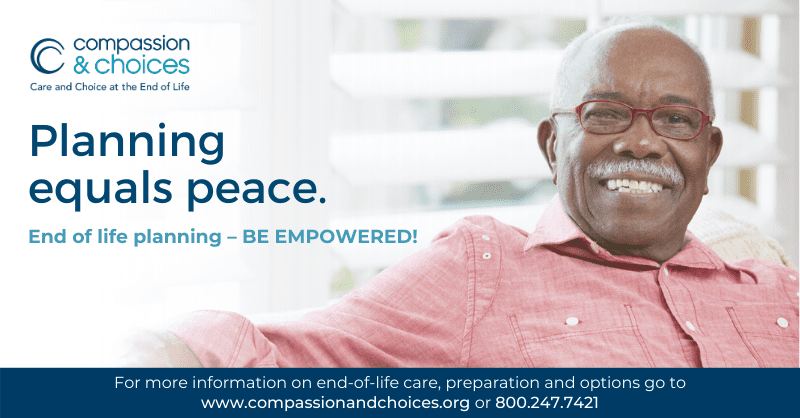 Building relationships with reporters, bloggers and media outlets interested in content related to C&C resource tool kits.
Building relationships with reporters, bloggers and media outlets interested in content related to C&C resource tool kits.- Speaking at regional and national conferences to bring our voice and messages to individuals and influencers alike.
Influencing Healthcare Policy
Compassion & Choices is also advocating for 21st-century modernization of end-of-life care to address the many shortcomings associated with advance planning, including:
- Develop and promote an evidence-based policy agenda to address the structural impediments to equitable access to end-of-life care.
- Advance legislative and regulatory changes through federal and state advocacy to ensure widespread adoption and effective implementation of policies that result in equitable access to the full range of end-of-life care.
Compassion & Choices continues to strive for its strategic goal to realize a diverse, equitable and inclusive movement in the areas of race, religion, party affiliation, sexual orientation, gender identity and age, so people of all demographic groups approach life’s end equipped with information and encouraged to claim their voice.
We are proud of our progress and the impact it is having across our movement, and we look forward to expanding our impact on all communities with a stake in quality end-of-life care, patient autonomy and the full range of options.
Within Compassion & Choices
We believe diversity is a critical piece of our culture; and that without equity and inclusivity our diverse board, leadership and staff would not be able to do their best work to advance end-of-life options and care for all people.
We renewed our commitment to breaking down discrimination and bias and creating a more inclusive workplace that is representative of the many unique cultures and backgrounds of our society. Our progress is ongoing and includes:
- Implementing a strategic training program to help us learn to recognize unconscious bias and change our behaviors and created a core internal DEI team to establish accountability for progress and identify needs and gaps.
- Conducting annual pay equity reviews and adjustments and incorporated DEI metrics in our performance reviews.
- Ensuring that our recruitment strategy to attract and retain people from differing backgrounds to all staff and leadership positions, as well as our board of directors.
- Actively seeking contracts with people and organizations from a range of cultures and backgrounds.
- Creating a mechanism for ongoing feedback through annual surveys and feedback to track our progress over time.
- Hosting a summit to inform a policy agenda that addresses disparities in care and treatment at the end of life.
And, we’re seeing the results.

This progress is encouraging. Under the leadership of our president and CEO, the National Director of Diversity, Equity, Inclusion and Human Resources and our independent advisors, the Raben Group, we have begun to change the way we approach our operations at Compassion & Choices and will continue to view our progress through the same social justice lens that drives our work to advance the end-of-life care movement.


